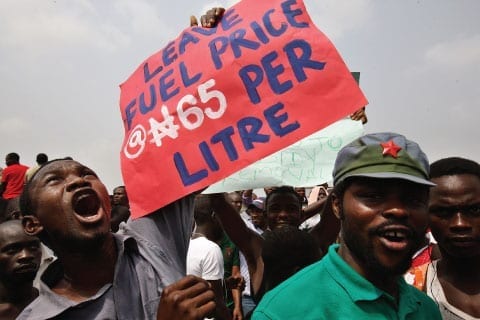Nigeria’s largest trade union federations will call a nationwide strike May 18 unless the Nigerian government returns fuel subsidies it removed on May 11.
Meeting over the weekend, the executive councils of the Nigeria Labor Congress (NLC) and the Trade Union Congress of Nigeria (TUC), which together represent millions of workers, along with civil society organizations, decried the nearly 50 percent hike in fuel prices caused by deregulation and called on the government to return fuel subsidies and prosecute those involved in subsidy scams.
In a joint statement, the groups said that over the past five years, “there has been no increase in salaries or wages or pensions in the face of devaluations, spiraling inflation and other vagaries of the economy,” making the rising price of fuel “unrealistic, unaffordable (and) unacceptable.”
More than half of Nigeria’s population lives below the international poverty line of $1.25 a day, according to the most recent figures from UNICEF.
Although Nigeria is Africa’s biggest petroleum producer, the country imports nearly all of its refined fuel, unlike most members of the Oil and Petroleum Exporting Countries (OPEC), and is currently facing a severe shortage. Unions and civil society organizations are urging the government to create enhanced local refining capacity to permanently solve the problem of scarcity.
Eighty percent of Nigeria’s foreign currency comes from the petroleum industry.
The groups pointed out that the volatility of the country’s black market makes it unlikely the government will be able to stop fuel prices from rising further. They also cited the plunging local currency, the naira, which has rapidly begun depreciating against the dollar since deregulation, as furthering limiting consumers’ ability to purchase basic goods.
In calling for government measures to reverse fuel deregulation, the groups also are pushing for reform in the electricity sector, urging the government to end billing based on estimating electricity usage and make meters available to consumers.
When the government last attempted to deregulate fuel prices in January 2012, striking workers and students shut down airports, offices and shops, paralyzing the country for 10 days. At least 10 people died and hundreds were injured during the strike. Workers returned to their jobs after the government partially restored the fuel subsidy.
Unions also are calling on the government to involve labor in negotiating key policy issues and reverse privatization processes long pushed for by the International Monetary Fund and World Bank, including deregulation, which the groups say contravene “the constitutional provision that says government shall be the driver of the economy.”

